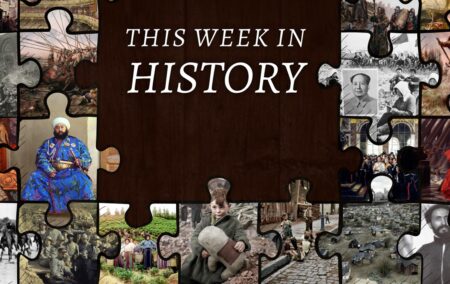This Week in History recalls memorable and decisive events and personalities of the past.
27th November 1978 – The Kurdistan Workers’ Party (PKK) is founded in the Turkish village of Fis
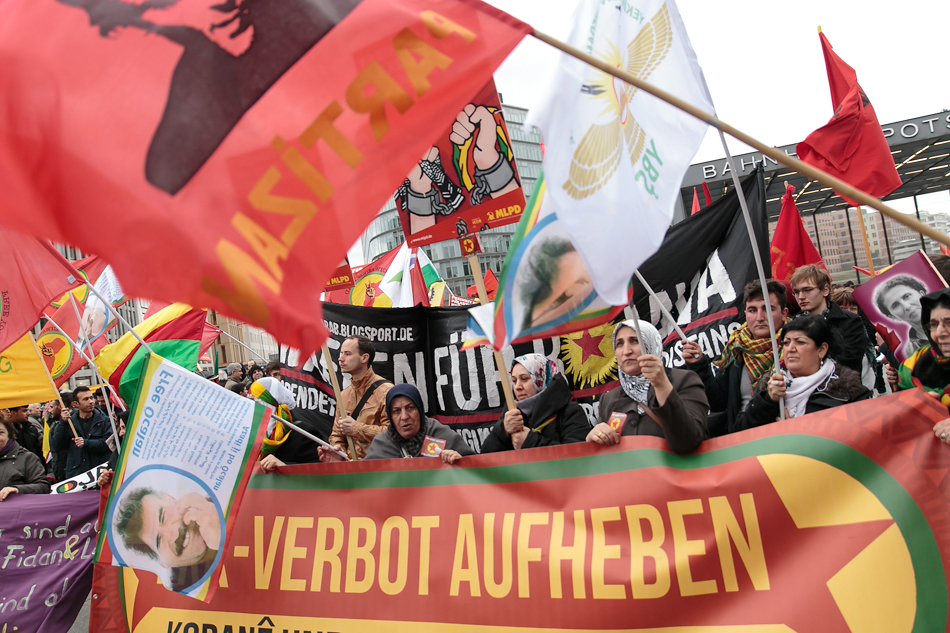
A 2016 protest in Germany for the release of PKK leader Abdullah Öcalan, who was captured and imprisoned in Turkey in 1999
The Kurdish people have sometimes been called the world’s largest ethnic group without a nation state. Somewhere around 40 million people today identify as Kurdish, with around half living in Turkey and millions more in Iran, Iraq, and Syria. Outside the Middle East there an estimated one million Kurds living in Germany and hundreds of thousands in France, Sweden and the Netherlands.
There are certainly objections to the claim that the Kurds are the world’s largest ethnic group without a state, which depend a lot on how you define ethnic group and nation state, but what is indisputable is that discrimination against the Kurds and Kurdish nationalism have both played an important role in the history of the 20th century Middle East.
The origins of the Kurdish people are fiercely debated to this day. The Kurdish language is an Indo-European language of the Iranian branch and Kurdish contains four main dialects which are not all mutually intelligible. Closely related major languages to Kurdish are Persian and Pashto.
Some scholars claim that the Kurds are descended from pre-Indo-European peoples who have lived in eastern Anatolia and western Iran since before the Indo-European migrations. This would make them descendents of a group called the Qarduchi who later adopted Indo-European languages. This view is rejected by most modern scholars.
Less controversially, it is believed that the term Kurd first came to mean people living a particular lifestyle rather than a connected ethic group. The term Kurd was used in the early Islamic period around the year 700 to refer to nomads living in the north-western Iranian region. Some of these people may have been Iranian speakers who moved west, while others were Arab peoples who moved north and adopted an Iranian language. Others may have been Armenians who left Armenia and integrated with other groups south of the Armenian heartland.
The Kurdish homeland was located in the area between the two great powers of the Middle East in late antiquity, the Roman and Persian empires, with the peoples of these regions often switching their allegiance between Rome and Persia. This lasted until the fall of the Persian Empire to the Islamic conquests in the 600s and 700s. Most Kurds were then under the rule of the Islamic caliphates until their collapse in the 900s.
By around the year 900 there appear to have been a number of principalities in eastern Anatolia which were identifiably Kurdish and we can definitively say that this is the latest date for the emergence of a Kurdish identity.
Between 1115 and the early 1400s, many of the Kurdish peoples in western Iran were unified by the Hazaraspid dynasty who carved out a principality for themselves and were powerful vassals of first the Seljuk Turks and later the Mongol Ilkhanate. However, they were defeated and destroyed by the Timurid invasions in the early 1400s.
The most famous Kurd of the Middle Ages, roughly contemporary with the Hazaraspids, was the famous Islamic ruler and hero Salah ad-Din Yusuf ibn Ayyub, or as he is known in the west, Saladin.
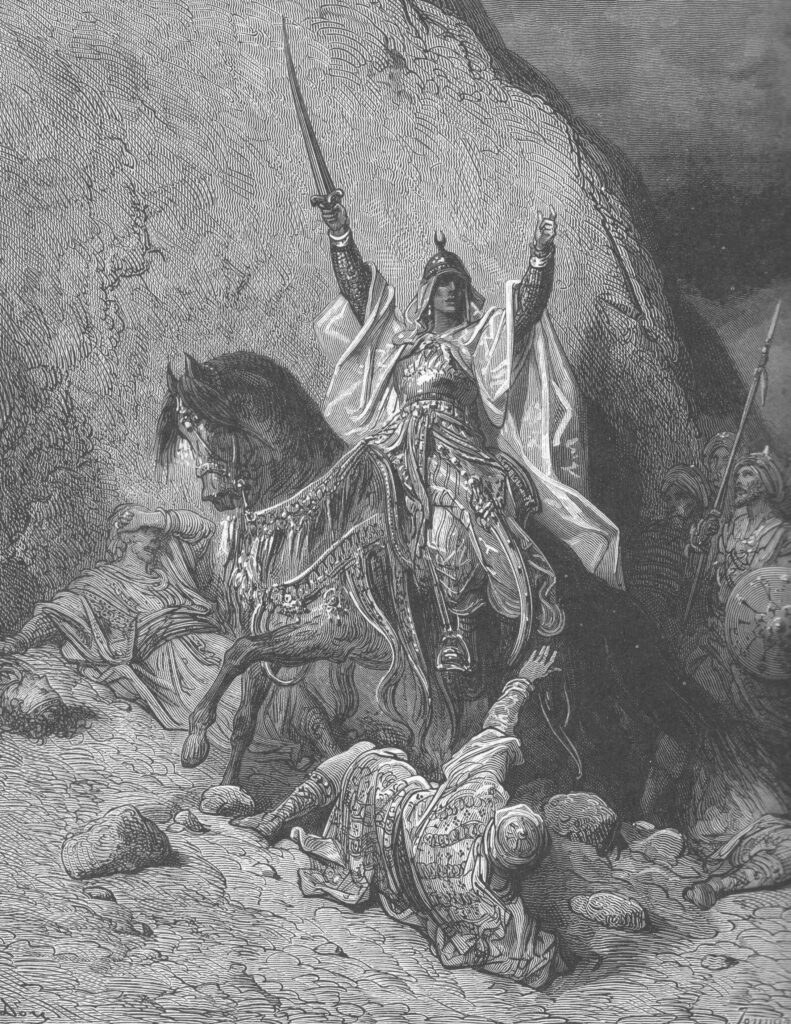
Gustave Doré’s depiction of Ṣalāḥ ad-Dīn Yūsuf ibn Ayyūb, or Saladin
Saladin founded the Ayyubid dynasty (1171–1260) which ruled Egypt and most of Syria and the Levant − but the Ayyubids were eventually overthrown and replaced by their Mamluk slave soldiers.
After the collapse of the Hazaraspid and Ayyubid dynasties, small Kurdish principalities pop up from the 1400s into the 1500s.
The Kurds found themselves once again between two major empires, this time the Sunni Muslim Ottoman Turks to the west, and the Shia Safavid Persians to the east. At first, most Kurds lived in the Persian Empire, but during the 16th century they were mostly conquered by the Ottomans.
The wars between Persia and the Ottomans devastated much of the Kurdish homeland and included the forced resettlement of many Kurds to other parts of the Persian Empire.
Between the early 16th century and the 19th century most Kurds lived fairly autonomously as part of the Ottoman Empire with some Kurdish rulers occasionally revolting unsuccessfully against the Ottomans. Most Kurds, however, remained loyal Ottoman subjects.
Things began to change in the early 1800s as the weak and decaying Ottoman state attempted to centralise power and modernise its administration. This was strongly opposed by many of the old elites, including the Kurdish chiefs who, so long as they paid some tax, were mostly left alone by the Ottomans.
After the Russo-Turkish War of 1828–29 Kurdish chiefs launched a revolt against Ottoman rule in 1830. This failed and the Kurds were punished with the loss of much autonomy. From this point on there were numerous revolts against Ottoman rule. While these revolts had some nationalist aspects, modern Kurdish nationalism based on the idea of Kurds being a wholly distinct people who should self-govern was not a major force until the late 1800s when Arab, Turkish and Kurdish nationalism were all embraced by urban middle class intellectuals.
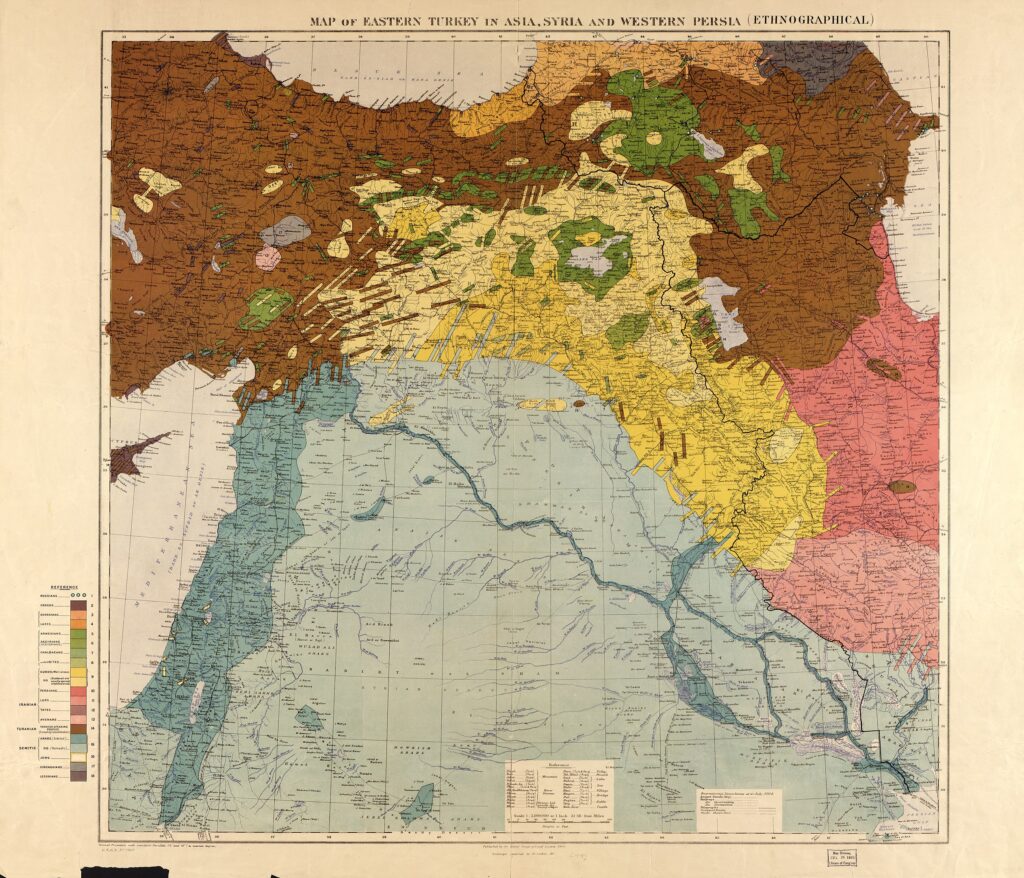
Maunsell’s map of 1910, a Pre-World War I British Ethnographical Map of the Middle East, showing the Kurdish regions in yellow (both light and dark)
After the First World War, (1914-1918) the Ottoman Empire collapsed and the Allied powers of France, Britian and Italy attempted to carve up the empire. They were joined by the Greeks in the west, Armenians seeking separation from Turkey after the Armenian genocide, and Kurds who sought to establish an independent state.
The Ottoman government in 1920 signed an agreement called the Treaty of Sèvres with the Allied powers, which would divide up the empire. The treaty also included a provision for a plebiscite to be held in eastern Anatolia to establish a Kurdish state.
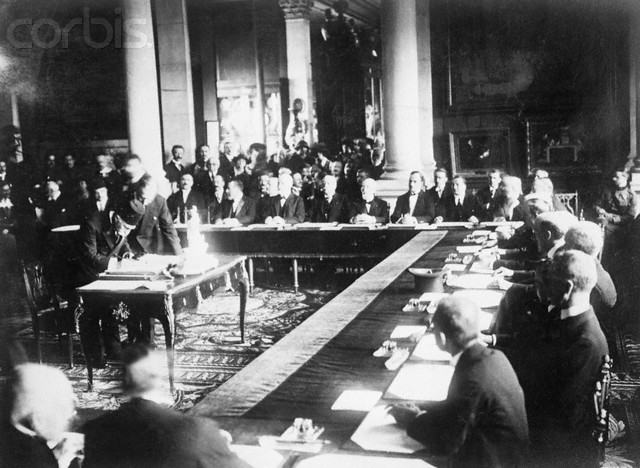
The signing of the Treaty of Sèvres
However, the treaty was rejected by Turkish nationalist leader Mustafa Kemal Pasha, later known as Atatürk, triggering the Turkish War of Independence. During the war Atatürk established the Republic of Turkey and dissolved the Ottoman Empire. Some Kurds supported the Turks in the war against the Imperial European powers and in this period Turkish leaders emphasised common Islamic identity to get Kurdish support.
Turkey would win the war and the new Republic of Turkey would be established along radically secular and nationalist lines.
Once the dust had settled, the Kurds found themselves split between French-controlled Syria, British-controlled Iraq, Iran and Turkey, with around half of Kurds, making up 20% of Turkey’s population, living in Turkey.
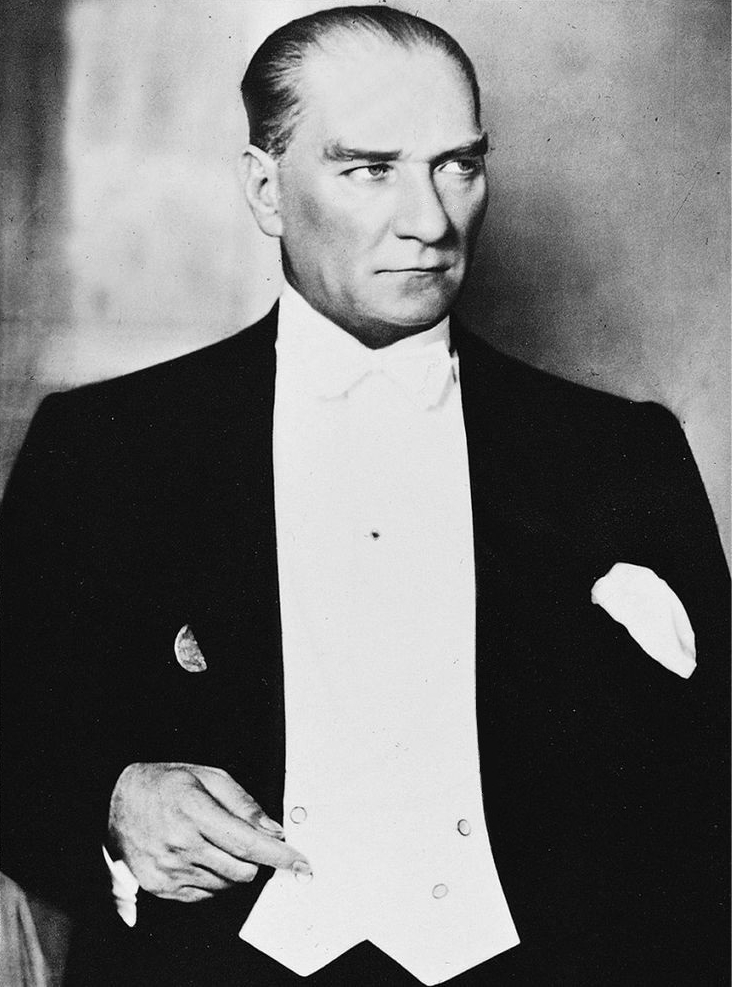
A portrait of Atatürk from the 1930s
After coming to power, Atatürk abolished the office of the Caliphate, secularised education, forcibly closed many religious institutions, and changed the Turkish alphabet to use Latin script.
He also engaged in extensive programmes to “Turkify the nation”. Until 2013 the letters Q, W, and X, which are not used in Turkish but are used in Kurdish were banned from use in non-foreign words and names. People were required to change their surnames to be more Turkish, and Kurds as an identity group were denied by the Turkish state, which instead reclassified them as “Mountain Turks”. The teaching of Kurdish became illegal, and the state mandated the teaching of Turkish in all schools. Turkish nationalists believed that Kurds had been brainwashed by foreign influence into forgetting their true origins as a Turkic people and that the Turkish state.
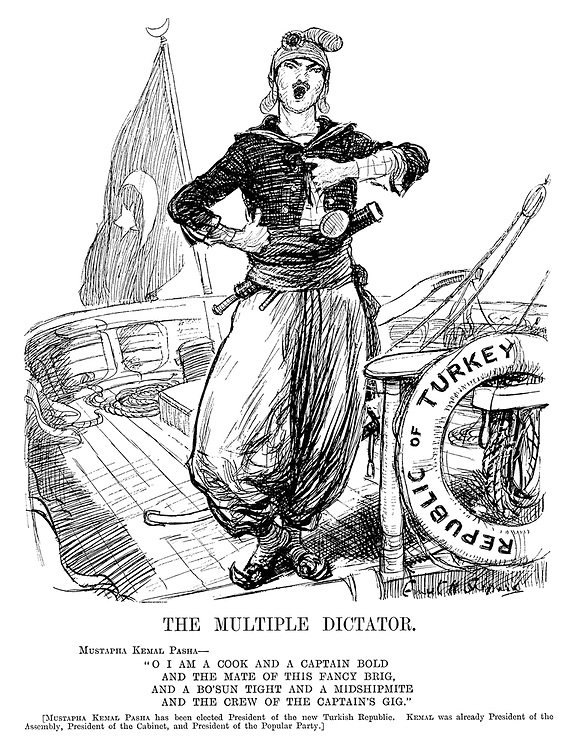
A British cartoon of 1923 satirising Atatürk’s rule in Turkey
The legality of Kurdish has fluctuated in Turkey since but has remained discriminated against since the 1920s. People are occasionally attacked in public for speaking Kurdish in some parts of Turkey.
Starting in 1925, the Kurds rebelled against both the secularisation of society and the suppression of Kurdish with numerous revolts throughout the 1920s and 30s. In response the Turkish government cracked down brutally with executions, mass arrests and displacement of Kurds into more Turkish areas in an attempt to assimilate them.
Some Kurds worked within the Turkish political system to enact reform and changes. Other Kurds gravitated towards far-left ideologies.
In the 1970s, radical Kurdish nationalists began to cooperate with Turkish Marxist groups and would go on to form a rebel group known as the Kurdistan Workers’ Party or PKK founded by a man called Abdullah Öcalan on 27 November 1978.
The PKK sought to overthrow the Western-allied Turkish government and establish a hardline communist Kurdish state in collaboration with a hardline communist Turkish state in alliance with the Soviet Union. Similar Kurdish nationalist organisations would appear in Syria, Iraq and Iran. Not all of these would be committed to Marxism, however. The Patriotic Union of Kurdistan in Iraq, for example, is slightly older than the PKK, shares similar nationalist ideas and is left-leaning but is not as hardline.
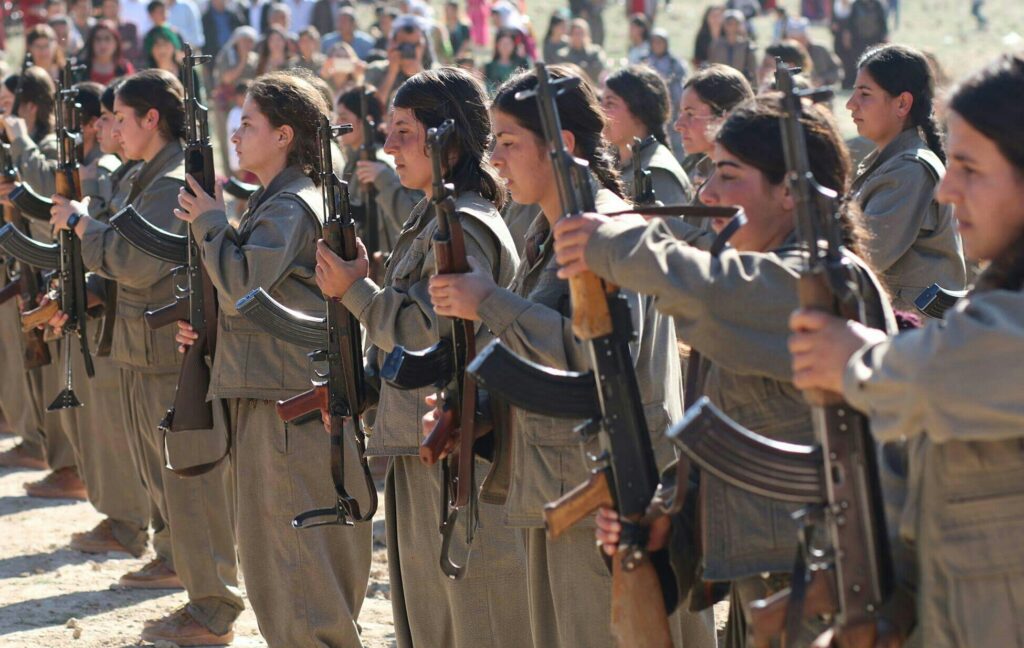
PKK female fighters [Kurdishstruggle, https://commons.wikimedia.org/w/index.php?curid=64848739]
After years of preparation, in 1984, the PKK declared a Kurdish uprising and began a brutal conflict with the Turkish government. The PKK often targets people it identifies as “collaborators”. Since the beginning of the PKK insurgency, around 40,000 mostly Kurdish civilians have been killed in the fighting. Both sides have carried out massacres and the PKK has used suicide bombings and is accused of using child soldiers and indulging in drug-trafficking by Turkey. The PKK is designated a terror group by Turkey, the US, EU, Japan, Iran, Israel, Syria and the UK.
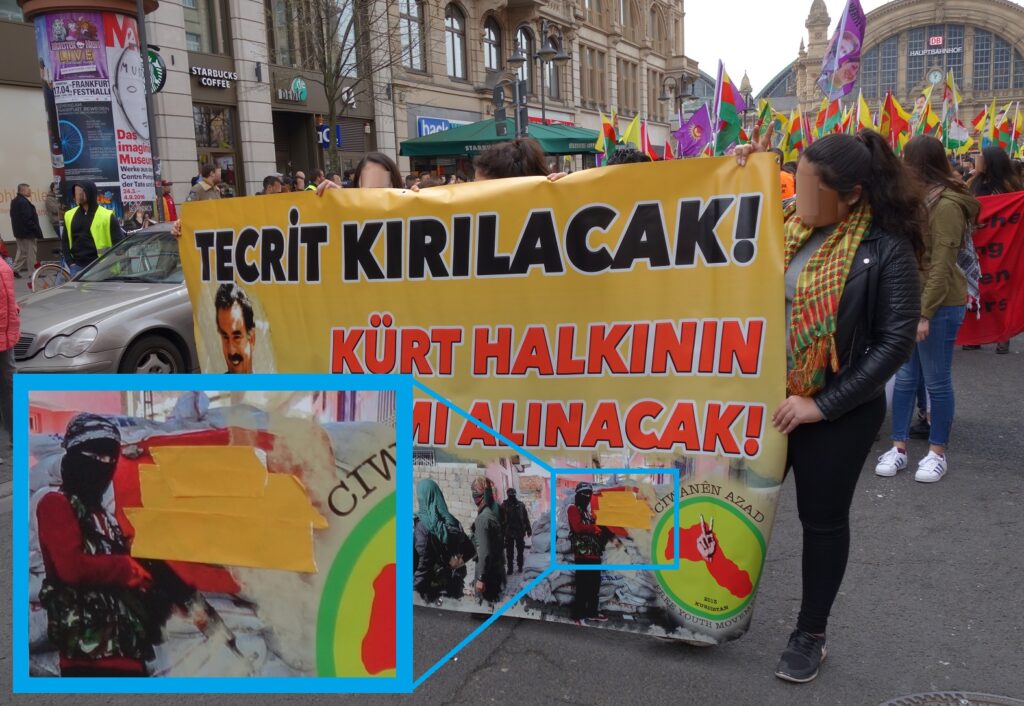
Since the PKK is forbidden in germany, its logo isn’t allowed to be shown there. At a political demonstration in Frankfurt in April 2016 it had to be pasted over by police order.[ X-angel, https://commons.wikimedia.org/w/index.php?curid=90942943]
While initially supporting total independence for the Kurds and the establishment of a Kurdish state, since the mid-90s the PKK has moved towards establishing a more federal Turkey with an autonomous Kurdish region of Turkey. However, many in the group have not abandoned the goal of independence.
Since 1993 there have been four ceasefires between the PKK and Turkish state, with the most recent lasting from 2012 to 2015.
Today the Turkish war with the PKK regularly spills over into Syria and Iraq, where nearly de-facto Kurdish states have been established within those countries by Kurdish groups.
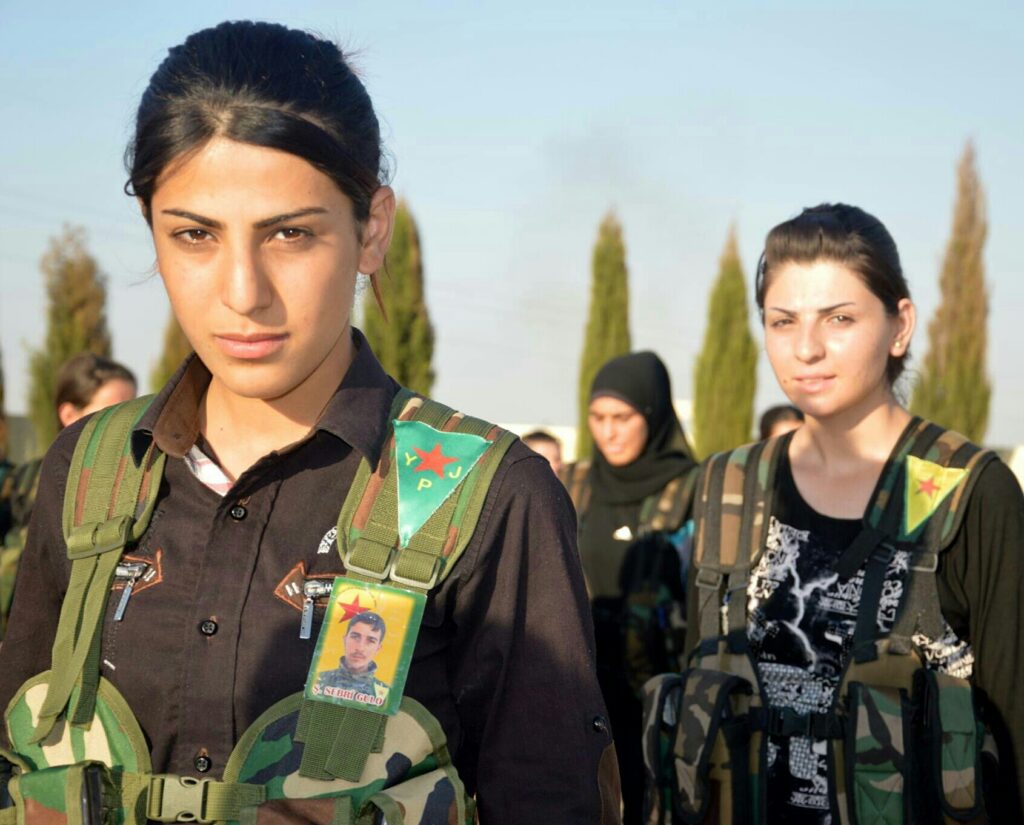
People’s Protection Unit (YPG) female units were fighting against ISIS in Syria [Kurdishstruggle https://www.flickr.com/photos/kurdishstruggle, https://commons.wikimedia.org/w/index.php?curid=64689947]
The Turkish and Kurdish conflict today still plays a major role in the ongoing Syrian civil war.
If you like what you have just read, support the Daily Friend

